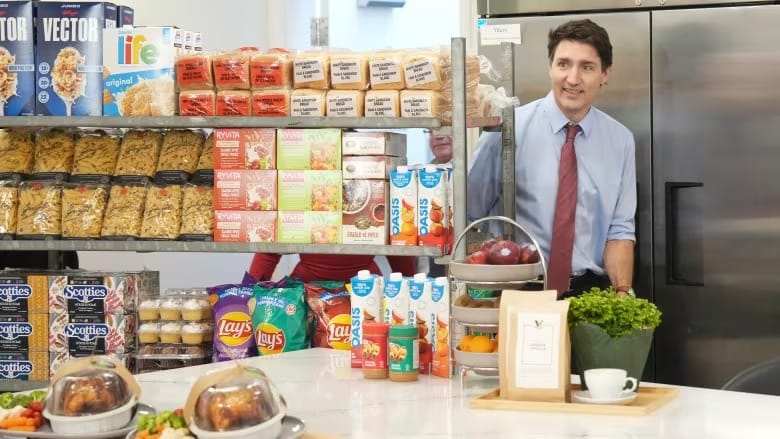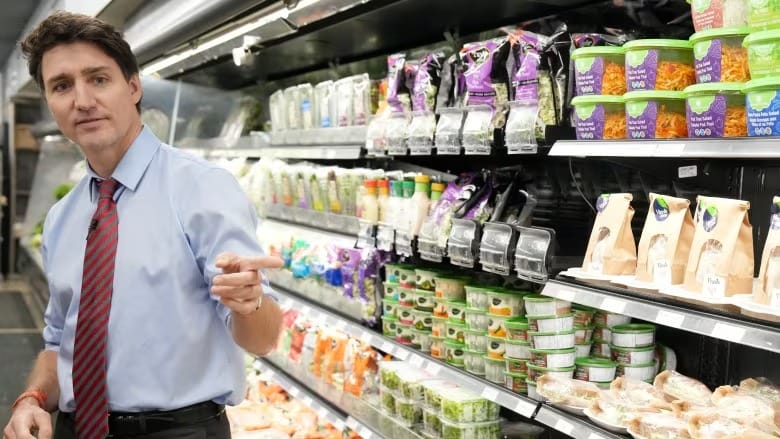Trudeau says ‘we’re ready’ for CUSMA review after Trump vows to reopen it
Prime Minister Justin Trudeau said Friday that Canada is “ready” for a likely renegotiation of the Canada-United States-Mexico Agreement (CUSMA) after Donald Trump vowed to reopen the free trade deal if he returns to the White House.

Prime Minister Justin Trudeau stated on Friday that Canada is "ready" for a possible renegotiation of the Canada-United States-Mexico Agreement (CUSMA), following Donald Trump's promise to reopen the trade deal if he returns to the White House.
During a speech to the Detroit Economic Club on Thursday, Trump said he would invoke CUSMA's six-year review clause and push for new protections for the U.S. auto industry against Chinese interests. U.S. Vice-President Kamala Harris, who is running against Trump in the upcoming election, has also expressed her intention to review the agreement.
Speaking from Laos at the conclusion of the ASEAN Summit, Trudeau emphasized that his government would continue to protect Canadian workers and industries, as it did during the tense negotiations with Trump's previous administration that resulted in CUSMA, often referred to as the "new NAFTA."
“We’ve been here before,” Trudeau said, adding that Canada has successfully negotiated deals with Europe, Asian partners, and CUSMA itself by standing up for Canadian jobs and highlighting the deep economic integration with the United States. “We’re ready to do it again if necessary.”
CUSMA, which replaced the North American Free Trade Agreement (NAFTA) when it took effect in 2020, is due for review in 2026. All three signatories—Canada, the U.S., and Mexico—must confirm whether they wish to extend or renegotiate the deal.
In his Detroit speech, Trump announced, "Upon taking office, I will formally inform Mexico and Canada of my intention to invoke the six-year renegotiation provisions of the USMCA that I put in." He added, “Oh, I’m going to have a lot of fun.”
Much of Trump’s remarks focused on the U.S. auto industry, largely based in Detroit. He suggested he wants to amend CUSMA to prevent Chinese auto companies from building plants in Mexico and benefitting from Mexico’s access to the U.S. vehicle market. CUSMA already includes a "rules of origin" clause that mandates a higher percentage of North American-made parts in vehicles, compared to NAFTA.
Trump also vowed to introduce stricter protections to prevent countries like China from smuggling goods into the U.S. through Mexico, harming American workers and supply chains. “They smuggle this stuff in. They don’t pay anything. We’re going to have very strong language on that,” he said.
Reports suggest that Chinese automaker BYD, a leading supplier in Mexico, is planning to build a new auto plant there, though it is waiting for the U.S. election outcome before making a final decision. Trump threatened tariffs as high as 1,000 percent on Chinese auto companies operating in Mexico, saying, "I don’t want to see them."
While Trump did not address any specific complaints regarding Canada in his speech, Canada is preparing for potential economic fallout. During the NAFTA negotiations, Canada faced U.S. tariffs on steel and aluminum, and Trump has promised to impose across-the-board tariffs of 10 to 20 percent on all foreign imports, a move economists warn could lead to a recession in Canada.
Harris also seeks CUSMA review
Harris has criticized CUSMA, referring to it as "Trump’s trade deal," and has blamed it for job losses in the U.S. manufacturing sector during Trump’s presidency. She also cited a claim by the United Auto Workers union that auto manufacturer Stellantis is planning to move production from the U.S. to Canada, though Stellantis has denied this. Harris argued that CUSMA made such moves “far too easy.”
Harris was one of just 10 U.S. senators who voted against CUSMA in 2020. In a statement last month, she said she would reopen the deal as president. "Many who voted for this deal conditioned their support on a review process, which, as president, I will use," she wrote. Although Harris acknowledged that the environmental provisions in the agreement were "insufficient," she emphasized that her opposition stemmed from the lack of adequate protections for U.S. workers.
Both Canada’s chief economist and the U.S. trade representative have reported that CUSMA has had a positive effect on their economies, especially in the automotive sector.
Kimberly Clausing, an economist and senior fellow at the Peterson Institute for International Economics, told *Global News* that while both Trump and Harris are making bold claims about CUSMA on the campaign trail, they may reconsider once in office. "If you’re going to expend political capital to do international economic things, you should try to be more bold and do things with more substance, rather than tinkering with an agreement that’s basically working,” she said.
Clausing also noted that CUSMA received strong bipartisan support at the time, despite Harris's opposition, and she sees no reason to reconsider the agreement. "I don’t think there’s anything that’s happened in the time since that would really make one rethink that,” Clausing added.





